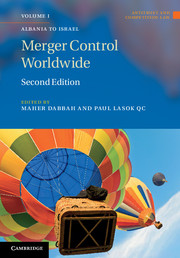Book contents
- Frontmatter
- Contents
- Preface
- List of Contributors
- Table of cases
- Table of Legislation and Official Guidance
- Introduction
- Albania
- Argentina
- Armenia (Republic of Armenia)
- Australia
- Austria
- Barbados
- Belgium
- Bosnia and Herzegovina
- Brazil
- Bulgaria (Republic of Bulgaria)
- Canada
- Chile
- China*
- Costa Rica
- Croatia
- Cyprus (Republic of Cyprus)
- Czech Republic
- Denmark
- Estonia
- European Economic Area
- European Union
- Finland
- France
- Germany (Federal Republic of Germany)
- Greece
- Hong Kong
- Hungary
- Iceland
- India
- Indonesia (Republic of Indonesia)
- Ireland
- Israel
- Italy
- Japan
- Kenya
- Korea
- Latvia
- Lithuania
- Macedonia (Republic of Macedonia)
- Malta
- Mexico
- Netherlands (The Netherlands)
- New Zealand
- Norway
- Pakistan
- Peru
- Philippines (Republic of the Philippines)
- Poland
- Portugal
- Romania
- Russia
- Serbia
- Singapore
- Slovakia (Slovak Republic)
- Slovenia
- South Africa
- Spain
- Sri Lanka
- Sweden
- Switzerland
- Taiwan
- Thailand
- Tunisia (Republic of Tunisia)
- Turkey
- Ukraine
- United Kingdom
- United States of America
- Uzbekistan
- Venezuela
- Zambia
- Index
Indonesia (Republic of Indonesia)
Published online by Cambridge University Press: 05 November 2014
- Frontmatter
- Contents
- Preface
- List of Contributors
- Table of cases
- Table of Legislation and Official Guidance
- Introduction
- Albania
- Argentina
- Armenia (Republic of Armenia)
- Australia
- Austria
- Barbados
- Belgium
- Bosnia and Herzegovina
- Brazil
- Bulgaria (Republic of Bulgaria)
- Canada
- Chile
- China*
- Costa Rica
- Croatia
- Cyprus (Republic of Cyprus)
- Czech Republic
- Denmark
- Estonia
- European Economic Area
- European Union
- Finland
- France
- Germany (Federal Republic of Germany)
- Greece
- Hong Kong
- Hungary
- Iceland
- India
- Indonesia (Republic of Indonesia)
- Ireland
- Israel
- Italy
- Japan
- Kenya
- Korea
- Latvia
- Lithuania
- Macedonia (Republic of Macedonia)
- Malta
- Mexico
- Netherlands (The Netherlands)
- New Zealand
- Norway
- Pakistan
- Peru
- Philippines (Republic of the Philippines)
- Poland
- Portugal
- Romania
- Russia
- Serbia
- Singapore
- Slovakia (Slovak Republic)
- Slovenia
- South Africa
- Spain
- Sri Lanka
- Sweden
- Switzerland
- Taiwan
- Thailand
- Tunisia (Republic of Tunisia)
- Turkey
- Ukraine
- United Kingdom
- United States of America
- Uzbekistan
- Venezuela
- Zambia
- Index
Summary
The free market underpinnings of substantive competition law and practice and organised enforcement of competitive behaviour in the Republic of Indonesia are still under development. Unlike other developed jurisdictions, which have a long tradition of antitrust laws, competition law in Indonesia is relatively new, having been introduced by the enactment of the Competition Law in 1999 (‘the Law’).
Since its introduction 5 years ago, the Business Competition Supervisory Commission (‘the KPPU’) has made many decisions in an attempt to enforce the Law, stimulate the competitive climate for economic and business activities in Indonesia and eliminate the monopolistic and unfair business practices which predominantly prevailed in the business environment prior to the enactment of the Law.
It should be noted at the outset that, although anti-competitive agreements and behaviour are currently regulated, and administrative and civil actions have been effected against parties infringing the provisions of the law, there has at the time of writing been no enforcement of the merger control provisions. Moreover, owing to the absence of certain implementing provisions discussed further in Section 3.1. below, it can generally be concluded that the merger control provisions in Indonesia are not yet in force.
- Type
- Chapter
- Information
- Merger Control Worldwide , pp. 724 - 744Publisher: Cambridge University PressPrint publication year: 2012



